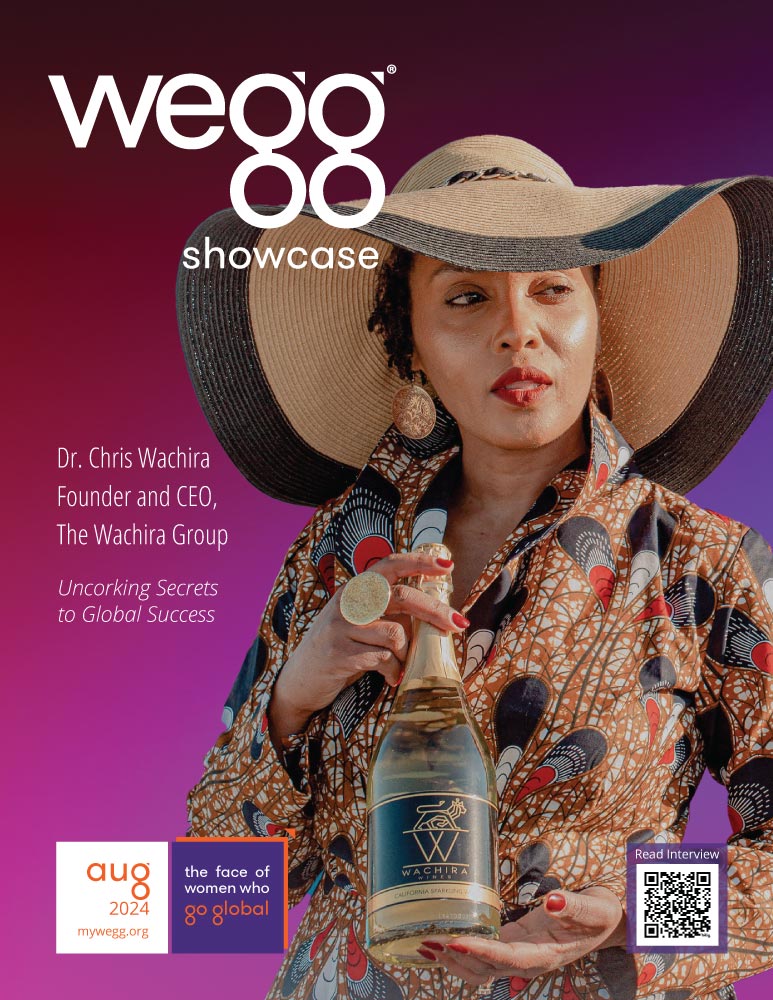wegg® showcase: Dr. Chris Wachira, Founder and CEO, The Wachira Group
July 31, 2024BruceDayneIssue 3: August 2024

What inspired you to start the Wachira Group?
The first and foundational company in the Wachira Group is Wachira Wines. I am Kenyan American, born and raised in Kenya, and I couldn’t find a wine that complemented the food my mother made for our Sunday dinners. I thought I’ll craft a wine for her and that’s how it started. Wachira Wines combined my fascination with the science of winemaking, because I have a science background, and not being able to find a wine that complemented Kenyan cuisine.
The first wines we crafted were a chardonnay, a cabernet, and a muscat. We tested them on family and friends around the dinner table, but they did not quite make the mark and never made it to market. I then found a Bay Area winemaker who took me under his wing. I was fascinated by the science of winemaking, but he taught me the art of winemaking.
Wachira Wines was a passion project, but every subsequent business venture under the Wachira Group was driven by a need in the market. For example, it was challenging for me, an immigrant Black woman, to break into the wine industry and get my products on shelves. I discovered that other makers like me, people of color and especially women, were having the same problem. We needed our own ecosystem. So the second company I founded under the Wachira Group was SOKO Distributors. It is the first company licensed in the state of California to distribute minority-produced wine, beer, and liquor.
The third company under Wachira Group, and also part of our ecosystem, is a brick-and-mortar retail outlet called Karibu. It means “welcome” in Swahili. It was my COVID baby! I opened it at 1419 Park Street, Alameda, California, in 2021. Karibu invites other makers, especially minority small-batch crafters of wine and beer, to come and serve their products to customers. Not only that, it’s also a retail outlet for their products.
How did your immigrant experience play a role in your entrepreneurship?
I arrived in the U.S. as a twenty-three-year-old. Like everybody else, I came here for a better life. In Kenya, everyone I grew up around looked like me. Some were educated, driven, and formidable. My mother, for example, was a nurse practitioner, my grandmothers were nurse practitioners, nurse midwifes. I also grew up around the poor, the sick, and the hungry, and they, too, looked like me. So I never considered myself less than or incapable. I had the confidence to go after something that fascinated me and was challenging. Then, being new to the U.S. and having to redefine myself gave me a toolset that allows me to be nimble, to reinvent, to pivot.
What challenges have you encountered and overcome to sell your products globally?
Ensuring I have enough funding for inventory to meet demand. Learning countries’ different regulatory requirements. Protecting my intellectual property. Not being fully connected to trade commissions and trade missions, which can feel a little bit exclusionary.
Another is establishing relationships in countries where I want to sell my products. My primary destination has always been Kenya, because our wines are crafted to pair with Kenyan food. Not having boots on the ground in Kenya, the challenge was finding a singular distribution partner in the country that has partnerships with multiple retail outlets. Plus, the sociopolitical fluidity of Kenya, with different regimes, adds a crease in the plan. Our goal, however, is to ship product to Kenya in time for the 2024 holiday season. The Middle East is another destination we are exploring, and also China / Asia, which would be a great market just based on quantity.
What advice would you give other women entrepreneurs who want to grow global?
My primary advice is to fully understand your industry. You have to do your homework, especially in the beverage space. There’s a difference between the crafting of your beverage and the business of your beverage. You have to know the regulatory aspects, the import costs, how long your products will sit in the water before they reach their destination. For an alcoholic beverage, the integrity of the product once it lands at the destination is a key issue. You must maintain some level of insurance over your product.
It’s a beautiful thing to take your brand global, because greater exposure and product recognition can translate into economies of scale and much better profit margins. There’s tremendous risk, of course, but there’s also tremendous opportunity.
Be prepared for circumstances that you don’t understand and look for help. Organizations like Women Entrepreneurs Grow Global provide a lot of help to entrepreneurs. Also, don’t measure yourself against others who have been in international trade for a while. Trust yourself enough to handle your specific situation and go forward, because until you get started, you don’t know what you can accomplish.
DMTBeautySpot
via https://dmtbeautyspot.com
Bob Marovich, DMT.NEWS, DMT BeautySpot,



0 comments